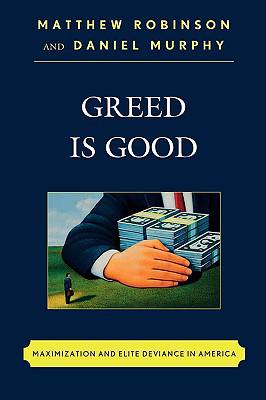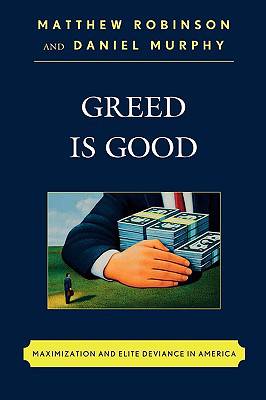
Bedankt voor het vertrouwen het afgelopen jaar! Om jou te bedanken bieden we GRATIS verzending (in België) aan op alles gedurende de hele maand januari.
- Afhalen na 1 uur in een winkel met voorraad
- In januari gratis thuislevering in België
- Ruim aanbod met 7 miljoen producten
Bedankt voor het vertrouwen het afgelopen jaar! Om jou te bedanken bieden we GRATIS verzending (in België) aan op alles gedurende de hele maand januari.
- Afhalen na 1 uur in een winkel met voorraad
- In januari gratis thuislevering in België
- Ruim aanbod met 7 miljoen producten
Zoeken
Greed is Good
Maximization and Elite Deviance in America
Matthew Robinson, Daniel Murphy
Paperback | Engels
€ 73,45
+ 146 punten
Uitvoering
Omschrijving
Through a new theory called Contextual Anomie/Strain Theory, Matthew Robinson and Daniel Murphy explain why deviance and crime are so widespread in American corporations. Exploring the simultaneous use of legitimate (i.e., legal) and illegitimate (i.e., deviant or illegal) means of opportunity in pursuit of one's goals, Greed is Good explains various forms of elite deviance and corporate crime.
Specificaties
Betrokkenen
- Auteur(s):
- Uitgeverij:
Inhoud
- Aantal bladzijden:
- 150
- Taal:
- Engels
Eigenschappen
- Productcode (EAN):
- 9780742560710
- Verschijningsdatum:
- 16/12/2008
- Uitvoering:
- Paperback
- Formaat:
- Trade paperback (VS)
- Afmetingen:
- 150 mm x 221 mm
- Gewicht:
- 249 g

Alleen bij Standaard Boekhandel
+ 146 punten op je klantenkaart van Standaard Boekhandel
Beoordelingen
We publiceren alleen reviews die voldoen aan de voorwaarden voor reviews. Bekijk onze voorwaarden voor reviews.









